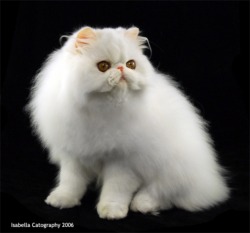Hairballs

There's nothing quite like the glorious feeling of stepping out of your warm bed onto a cold, squishy, slimy hairball! Perhaps we should feel flattered that our beloved feline companion has left a piece of herself as a special gift for us, but frankly, most of us would rather bond with our cats another way!
What causes hairballs in cats?
Nature gave cats lots of wonderful, soft fur. Normally, when kitty grooms and ingests the dead, loose hair, it passes through the gastrointestinal (digestive) tract and comes out in the stool. A carnivore's gut is designed to handle fur, its own as well as the fur attached to prey animals. (If you've ever been hiking and come across "scat" from a coyote or fox, it's evident that it is mostly fur.) However, generations of directed breeding have created cats with much longer coats than ever conceived of by natural selection. And some cats, even shorthairs, just seem to have tender tummies. When too much hair collects in the stomach rather than passing out through the gut, it irritates the stomach lining and whoops — there's a hairball, on its way back out the wrong end of the cat! (By the way, the correct medical term for a hairball is "trichobezoar," pronounced trike-oh-bee-zohr — your vet will be impressed!).
Problem signs of Hairballs
While an occasional hairball is no cause for alarm, if your cat is vomiting up a hairball more than once or twice a month, it's time to think about a plan of action. This will probably start with a trip to your veterinarian for a thorough exam. It's important to make sure the problem is only hairballs and not something more serious. Problem signs include hearing the "Hairball Hack" — that awful coughing sound cats make when trying to expel an offending ball of fur — if no hairball is forthcoming; and any frequent vomiting. Coughing without expelling a hairball can signal feline asthma, and frequent or persistent vomiting of any kind should always be checked by your vet.
A Holistic view
From a holistic point of view, excessive trouble with hairballs indicates a basic systemic or energetic imbalance. A holistic veterinarian would consider the entire cat, including history, previous medical problems, diet, environment, social and family issues — even the cat's personality. Hairballs would be just one symptom, one that will be weighed in totality with all the other information. For instance, a cat that follows the sunbeam all over the house, and sleeps next to the heater vent would receive different treatment than a cat that sits next to an open window in the dead of winter, even if they both displayed the "symptom" of frequent hairballs.
What causes hairballs in cats?
Nature gave cats lots of wonderful, soft fur. Normally, when kitty grooms and ingests the dead, loose hair, it passes through the gastrointestinal (digestive) tract and comes out in the stool. A carnivore's gut is designed to handle fur, its own as well as the fur attached to prey animals. (If you've ever been hiking and come across "scat" from a coyote or fox, it's evident that it is mostly fur.) However, generations of directed breeding have created cats with much longer coats than ever conceived of by natural selection. And some cats, even shorthairs, just seem to have tender tummies. When too much hair collects in the stomach rather than passing out through the gut, it irritates the stomach lining and whoops — there's a hairball, on its way back out the wrong end of the cat! (By the way, the correct medical term for a hairball is "trichobezoar," pronounced trike-oh-bee-zohr — your vet will be impressed!).
Problem signs of Hairballs
While an occasional hairball is no cause for alarm, if your cat is vomiting up a hairball more than once or twice a month, it's time to think about a plan of action. This will probably start with a trip to your veterinarian for a thorough exam. It's important to make sure the problem is only hairballs and not something more serious. Problem signs include hearing the "Hairball Hack" — that awful coughing sound cats make when trying to expel an offending ball of fur — if no hairball is forthcoming; and any frequent vomiting. Coughing without expelling a hairball can signal feline asthma, and frequent or persistent vomiting of any kind should always be checked by your vet.
A Holistic view
From a holistic point of view, excessive trouble with hairballs indicates a basic systemic or energetic imbalance. A holistic veterinarian would consider the entire cat, including history, previous medical problems, diet, environment, social and family issues — even the cat's personality. Hairballs would be just one symptom, one that will be weighed in totality with all the other information. For instance, a cat that follows the sunbeam all over the house, and sleeps next to the heater vent would receive different treatment than a cat that sits next to an open window in the dead of winter, even if they both displayed the "symptom" of frequent hairballs.

